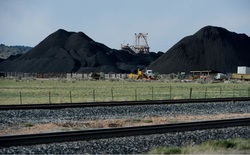|
Shashank Bengali Contact Reporter
A giant power plant set atop what was once a virgin forest churns with coal from a nearby mine, a roaring example of India's aspirations to best China's economic growth and light the homes of its poorest people. Yet the privately run Sasan power project — backed by hundreds of millions of dollars in U.S. government funding — has also generated land disputes, health and environmental concerns and financial hardship for villagers who say it has delivered little of what was promised. As India tries to bring electricity to 300 million people who lack it, it is defying international calls for reducing climate-changing fuel emissions and instead heavily expanding investments in coal, often with huge costs for rural people living in the path of the inexpensive fossil fuel. In the village of Amlohri two miles west of the Sasan plant, a mountain of rocky mining waste dumped by Reliance Power, the plant developer, surrounds a cluster of mud-and-brick dwellings, their tin roofs reflecting a blinding sun. Winds often scatter coal dust and fine rock over crops and into wells that store drinking water. Monsoon rains wash the soil down into the village and into homes whose walls have cracked, activists say, because of blasting from the mine. "Big trees were crushed under the rock," said Ramji Basor, one of several farmers who live in the shadow of the power plant about 375 miles southeast of New Delhi. "We found dirt and dust on everything." The stories told by Basor and his neighbors illustrate how not all Indians have benefited as coal propels their country in its bid to be the world's fastest growing major economy. India expects to double its coal production over the next five years to 1 billion tons annually. The Sasan project was touted as a win-win for both investors and residents, promising cheap electrical power and new housing and schools built by Reliance Power. But interviews with dozens of residents and officials in Sasan, and a review of public records detailing the locals' fight with the power plant, show that the company has failed to meet Indian standards for environmental protection. Its efforts to compensate villagers uprooted by the project have driven many deeper into poverty, partly because of India's flawed policies on resettling landowners, activists say. Assessments in 2012 by the Pollution Control Board of the central state of Madhya Pradesh, and in 2014 by the Indian Ministry of Environment and Forests, determined that the company's mining waste was illegally overflowing into forests and farmland and that the company had failed to meet obligations to restore green space lost to construction. The ministry also found that coal dust, which contains metals that can be toxic, had fallen into fields next to the mines. In August, a committee of experts reported to the National Green Tribunal, a court that hears environmental cases, that groundwater in the village of Harrahawa, next to the power plant, had high levels of mercury, which can cause birth defects and impair the nervous system. The report did not identify a source for the contamination. Environmental experts say it is almost certainly linked to Sasan and several other major power plants in the area. Indian regulators are notoriously toothless, however, and Reliance Power's plant and mines have continued to function. It is a decades-old story in central India's coal-rich Singrauli district, recently labeled one of the country's most polluted areas, where residents and activists have long complained that abuses by energy companies go unpunished. "Each and every company is violating environmental norms, including Sasan," said Ashwani Kumar Dubey, a Singrauli resident and lawyer who has challenged the coal industry in India's Supreme Court. "But nothing happens because these companies run the economy of the country." Reliance Power officials declined to answer questions about Sasan but said the company has supplied much-needed electricity and complied with all Indian social and environmental standards. The controversy has spread to the U.S. because of Sasan's American backer, the Export-Import Bank of the United States, a federal agency that finances the sale of U.S. products overseas. The bank lent Reliance Power $650 million beginning in 2013 to buy mining equipment from a supplier in Wisconsin, a loan that amounts to about 15% of the project's $4.3-billion total cost. The bank lost its congressional authorization June 30, after opposition from conservative Republicans who call its loans "corporate welfare," but its funding for Sasan is not affected. Advocacy groups say that even as the Obama administration seeks a worldwide agreement to reduce greenhouse gas emissions at a climate summit in Paris in December, Export-Import Bank has financed overseas coal power plants that emit huge quantities of climate-warming carbon. When Reliance Power was awarded the rights to the project several years ago, residents — including farmers and tribal people who eke out a premodern living from the forest — were swayed by the company's promises of jobs, cheaper electricity, new housing and other amenities, and signed over their land. But nearly all the jobs were temporary, ending when plant construction was completed. Basor, a slender man whose eyes narrow in the bright sun, is one of about two dozen Baiga tribal people living in the shadow of what has become a giant Reliance Power dump site. The 5-acre plot that sustained his family has become infertile. A gray patina of coal dust coats his crops; the nearby Rihand reservoir, whose water he used for irrigation, is fouled by coal ash and industrial effluent, according to government studies. Basor's eldest son, Suresh, got a job as a welder at one of the mines. But he felt the growing pressure of supporting his parents and four siblings as the farm struggled, his father said. One morning in April 2013, the wiry 18-year-old with shaggy dark hair was found lying in the dirt at the mine's entrance. A hospital report said he had ingested poison. Authorities called it a suicide. The company has offered Basor about $26,000 to vacate his land and get away from the potential pollution. But he said the amount isn't enough to buy a new home in an area where land prices have soared. "Everything depends on this farm," Basor said. "If I sell to Reliance, how will I find another job?" Kamala Prasad Panika, a silver-haired villager in his 40s, refused to sell his home for what he called unfair compensation. So Reliance Power built around him, swallowing his home, which now sits within the walls of the sprawling compound dominated by twin red-and-white smokestacks. The school his two sons attended was demolished to make way for a coal ash dump, and students were shifted to a new facility Reliance Power established at Surya Vihar, a resettlement colony it built 10 miles away. In June, administrators wrote to Panika saying that because he was not technically "resettled," his sons — sixth-grader Arjun and fourth-grader Mukesh — could not attend the school. "The next week," Panika said, "they were kicked out of their classes." Reliance Power describes Surya Vihar as part of "one of the most robust community development and corporate social responsibility initiatives by a power plant" in India. But only a few dozen of the colony's 376 small concrete houses are occupied. Villagers say the plots are far from jobs and too small for farming, the way their families have earned a living for generations. Many choose to live instead in makeshift dwellings closer to their former land, leaving Surya Vihar a ghost town. Weeds and thick brush encircle the vacant houses, where cows stand tethered to window frames with missing glass. "There is no way people here can make a living, not in the way they used to, and not in any other way, because they are so isolated," said Awadhesh Kumar, a longtime local activist. "The resettlement policy means destitution forever." Reliance Power says that under state and federal laws, local authorities bear ultimate responsibility for resettling people affected by industrial projects. So far, Sasan's economic benefits are unclear. Reliance Power won the Sasan bid by agreeing to sell power to seven states initially for less than 2 cents per kilowatt-hour. In May, the All India Power Engineers Federation accused the company of deliberately suppressing Sasan's electricity output in order to divert coal to its other plants, where it can sell power at a much higher rate. The group said Sasan's low production had forced states to buy electricity from other suppliers, costing them nearly $500 million. Activists say Export-Import Bank should have known from the start that there was potential for abuses at Sasan. "We have been fighting against the practices of Indian companies for years," Kumar said. "We didn't think we would have to fight a U.S. bank too." [email protected] http://www.latimes.com/world/asia/la-fg-india-us-coal-20151015-story.html
0 Comments
Leave a Reply. |
Gene HazzardDon't Be Envious of Evil Men Archives
June 2024
Categories
All
|
- Home
- Sanjiv Handa
- Gene's Blog
- Rotunda RFP
- Gene Hazzard -Keeping eyes open
- Chronology of Tagami's scheme of Private-Public Partnership with City Projects
- Another Tagami scheme - Rotunda Building deal
- Oakland Army Base
- Billboards in Oakland
- Port of Oakland
- Oakland Raiders?
-
Who is running Oakland?
- Jerry Brown
- Don Perata
- Judge Robert B. Freedman
- Jacques Barzaghi
- Gawfco Enterprises
- Deception
- Doug Bloch
-
Phil Tagami
>
- SF Business Times November 20, 2005
- Rotunda wrestling
- A conversation with Oakland developer Phil Tagami
- Audit of $91 million Fox Theater project
- Tagami Conflict
- CCIG Response to Oakland Works
- Oakland developer Phil Tagami named to state medical board
- ‘Shotgun Phil’ hits another bullseye — with governor’s help
- CleanOakland Store
- CenterPoint Properties


 RSS Feed
RSS Feed
